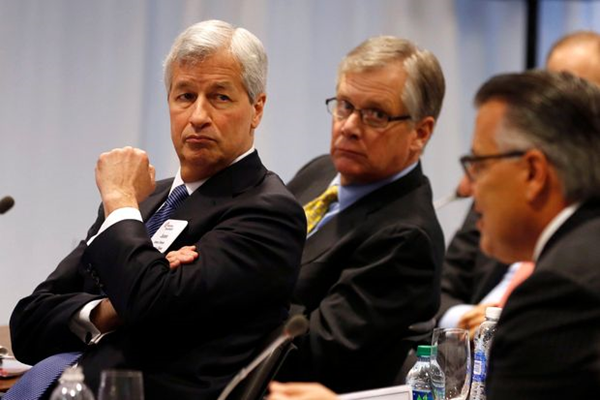THE
WALL STREET JOURNAL.
OPINION |
COMMENTARY
‘Stakeholder’ Capitalism Seems Mostly for Show
If CEOs really intended to amend their companies’ purpose, they’d
at least consult their boards first.
By Lucian Bebchuk and
Roberto Tallarita
Aug. 6, 2020 7:07 pm
ET
|

JPMorgan Chase CEO Jamie Dimon, left, at a meeting of the
Business Roundtable in Washington, Dec. 4, 2014.
PHOTO: LARRY DOWNING/REUTERS |
By putting American workers through months of turmoil,
the Covid-19 crisis has heightened expectations that large companies
will serve the interests of all “stakeholders,” not only shareholders.
The Business Roundtable raised such expectations last summer by
issuing a statement on corporate purpose, in which the CEOs of more
than 180 major companies committed to “deliver value to all
stakeholders.” Although the Roundtable described the statement as a
radical departure from shareholder primacy, observers have been
debating whether it signaled a significant shift in how business
operates or was a mere public-relations move. We have set out to
obtain evidence to resolve this question.
To probe what corporate leaders have in mind, we sought to
examine whether they treated joining the Business Roundtable statement as an
important corporate decision. Major decisions are typically made by boards of
directors. If the commitment expressed in the statement was supposed to produce
major changes in how companies treat stakeholders, the boards of the companies
should have been expected to approve or at least ratify it.
We contacted the companies whose CEOs signed the Business
Roundtable statement and asked who was the highest-level decision maker to
approve the decision. Of the 48 companies that responded, only one said the
decision was approved by the board of directors. The other 47 indicated that the
decision to sign the statement, supposedly adopting a major change in corporate
purpose, was not approved by the board of directors.
We received responses from only about three-tenths of the
signatories. Yet there is no reason to expect that these companies are less
likely than companies electing not to respond to have obtained board approval
for joining the statement.
What can explain a CEO’s decision to join the Business Roundtable
statement without board approval? Even “imperial” CEOs tend to push major
decisions through the board rather than disregard it. Similarly, it is
implausible that CEOs didn’t seek board approval because they viewed the
statement as reflecting a personal belief rather than a commitment made in their
“official” capacity. In fact, the Business Roundtable presented the statement as
a commitment by CEOs “to lead their companies for the benefit of all
stakeholders,” thus reflecting a pledge regarding the goals of the companies led
by these CEOs.
The most plausible explanation for the lack of board approval is
that CEOs didn’t regard the statement as a commitment to make a major change in
how their companies treat stakeholders. That may be because they believe their
companies are already meeting the standard for taking care of stakeholders. But
it still implies that they believed signing the statement wasn’t a major step
for their businesses.
We supplemented the evidence above with a review of the
board-approved corporate governance guidelines of the companies whose CEOs
joined the statement. We found that these guidelines, including the many that
have been updated since the issuance of the Business Roundtable statement,
mostly reflect a clear “shareholder primacy” approach.
Take the corporate governance guidelines of JPMorgan
Chase, whose
CEO, Jamie Dimon, chaired the Business Roundtable at the time the statement was
issued. These guidelines state that “the Board as a whole is responsible for the
oversight of management on behalf of the Firm’s shareholders.”
The corporate governance guidelines of Johnson
& Johnson —whose CEO, Alex Gorsky, served as chairman of the Business
Roundtable Corporate Governance Committee—indicate in clear terms that “the
business judgment of the Board must be exercised . . . in the long-term
interests of our shareholders.”
Further, about 70% of the U.S. companies that joined the
statement are incorporated in Delaware, which is widely viewed as a state with
shareholder-centric corporate laws. In a 2015 law-review article, Delaware Chief
Justice Leo Strine stated that “a clear-eyed look” at Delaware law “reveals that
. . . directors must make stockholder welfare their sole end.”
Nonetheless, the Business Roundtable, and the numerous Delaware
companies endorsing its statement, didn’t address the potential constraints
imposed by Delaware law. This disregard of the issue is consistent with the view
that corporate leaders don’t contemplate a significant change in corporate
strategy.
The evidence is clear: Notwithstanding statements to the
contrary, corporate leaders are generally still focused on shareholder value.
They can be expected to protect other stakeholders only to the extent that doing
so would not hurt share value. That conclusion will be greatly disappointing to
some and welcome to others. But all should be clear-eyed about what corporate
leaders are focused on and what they intend to deliver.
Messrs.
Bebchuk and Tallarita are director and associate director, respectively, of the
Harvard Law School Program on Corporate Governance. Their co-written study that
details their research, “The
Illusory Promise of Stakeholder Governance,” is scheduled for
publication in the autumn.
